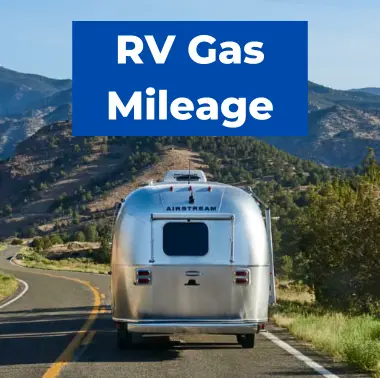RV gas mileage is a crucial factor to consider when planning an RV trip, especially for those on a budget. The average RV gas mileage is between 6-10 miles per gallon, and varies depending on several factors, including the RV’s class, weight, engine type, and driving habits.
Generally, Class B RVs and camper vans offer the best fuel economy, with an average of 18 to 25 miles per gallon. Class C motorhomes average between 14 and 18 miles per gallon, while most Class A coaches come in somewhere between 7 and 13 miles per gallon. Diesel RVs also usually get better mileage versus gas RVs.
With rising fuel costs, obviously these mileages can cause concern for RV owners. Fortunately there are steps you can take to improve your RV’s fuel efficiency.
We’ll cover some real-world examples of different RV mpg ratings and how to improve them in this guide.
Average RV Gas Mileage Chart
When it comes to RV gas mileage, it’s important to keep in mind that different classes of RVs will have different fuel efficiency. Here is a chart of the average gas mileage for each class:
| RV Class | Gas Mileage Range |
| Class A | 7-14 miles per gallon |
| Class B | 18-26 miles per gallon |
| Class C | 14-20 miles per gallon |
As you can see, Class B motorhomes tend to have the best gas mileage, while Class A motorhomes have the worst. This is because Class A motorhomes are generally larger and heavier, which requires more fuel to move around.
Of course, it’s important to keep in mind that these are just averages. Your real life motorhome gas mileage may vary depending on a number of factors, including the size and weight of your RV, the type of engine it has, and the terrain you’re driving on.
Overall, while gas mileage may not be the most exciting topic when it comes to RVing, it’s an important one to keep in mind if you want to save money on fuel and reduce your environmental impact.
By understanding the average gas mileage for each class of RV and taking steps to improve your own vehicle’s efficiency, you can enjoy all the benefits of RVing without breaking the bank.
Class A RV Gas Mileage
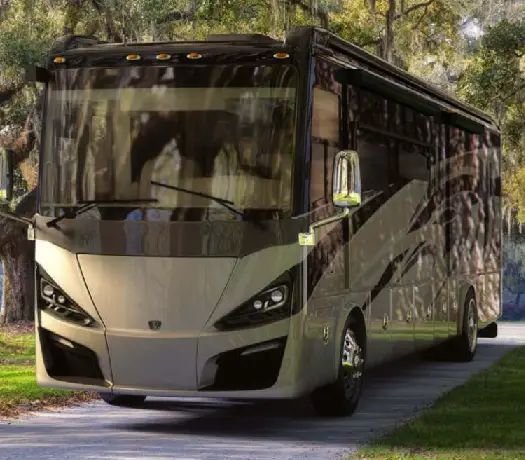
Class A RVs are known for their luxurious amenities and spacious living areas, but they are also infamous for their poor gas mileage. On average, a Class A motorhome gets between six and ten miles to the gallon. However, fuel efficiency can vary depending on several factors, such as the size and weight of the RV, the type of engine, and the driving conditions.
Class A RV Gas Mileage Examples
Here are a few examples of Class A RV gas mileage based on different factors:
- Class A motorhome with a gasoline engine: 6-10 MPG
- Class A motorhome with a diesel engine: 8-14 MPG
- Class A diesel pusher motorhome: 8-12 MPG
- Class A motorhome towing a car: 5-7 MPG
Class A RV Gas Mileage Chart
| Class A RV Make and Model | Class A RV Gas Mileage |
| Coachmen Mirada | 6-10 mpg |
| Entegra Coach Aspire | 7-10 mpg |
| Fleetwood Bounder | 6-10 mpg |
| Thor Palazzo | Up to 13 mpg |
| Tiffin Allegro Bus | 7-10 mpg |
| Newmar Dutch Star | 7-10 mpg |
| Winnebago Adventurer | 6-10 mpg |
| Monaco Diplomat | 7-10 mpg |
| Forest River Georgetown | 6-10 mpg |
| Itasca Ellipse | 7-10 mpg |
| Holiday Rambler Navigator | 10.6 mpg |
| Monaco Vesta | 10.7 mpg |
It is important to note that these are just rough estimates, and actual gas mileage can vary depending on several factors. For instance, driving in hilly or windy conditions can significantly decrease fuel efficiency.
Furthermore, the size and weight of the RV can also affect gas mileage. A larger and heavier Class A motorhome will generally get lower gas mileage than a smaller and lighter one.
In general, Class A RVs are not the most fuel-efficient vehicles on the road. However, there are some things you can do to improve gas mileage, such as driving at a steady speed, avoiding sudden stops and starts, and keeping the RV well-maintained.
If you are considering purchasing a Class A motorhome, it is important to factor in gas mileage as one of your expenses. While Class A RVs offer many luxurious amenities, they can also be costly to operate and maintain.
Class B RV Gas Mileage
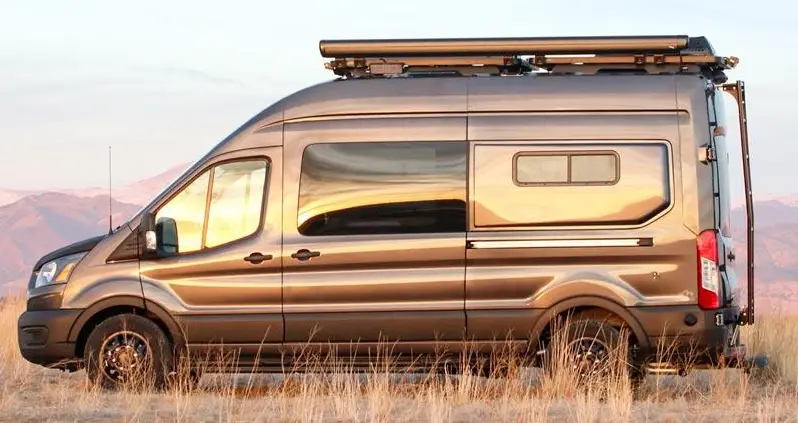
Class B RVs, also known as campervans, are the smallest of the motorized RVs. They offer excellent fuel economy, making them a popular choice for those who want to travel long distances without spending too much on gas.
On average, Class B RVs get between 18-26 miles per gallon. However, the actual gas mileage can vary depending on several factors, such as the model, weight, engine size, and driving conditions.
Class B RV Gas Mileage Examples
Here are a few examples of Class B RV gas mileage:
| Class B RV Make and Model | Class B RV Gas Mileage |
| Airstream Interstate Grand Tour EXT | 19 mpg |
| Airstream Tommy Bahama Interstate Lounge | 18 mpg |
| Roadtrek CS | 18 mpg |
| Winnebago Era Class B 70A | 18 mpg |
| Winnebago Travato 59G | 20 mpg |
| Thor Motor Coach Gemini 12SX | 18 mpg |
| Winnebago Rialta | 19mpg |
| Roadtrek Sprinter RS Adventurous | 20 mpg |
| Leisure Vans Serenity Standard Class B | 16 mpg |
| Airstream Grand Tour Twin | 17 mpg |
| Midwest Automotive Design Passage 170 Ext MDP4 Lounge | 19 mpg |
It’s important to note that Class B motorhome gas mileage can vary depending on the driving conditions. For example, driving on hills or in windy conditions can decrease gas mileage. On the other hand, driving on flat roads with no wind can increase gas mileage.
Class B RVs offer excellent gas mileage, making them a popular choice for those who want to travel long distances without spending too much on gas. Keep in mind that gas mileage can vary depending on several factors, so it’s important to choose a model that fits your needs and driving conditions.
Class C RV Gas Mileage
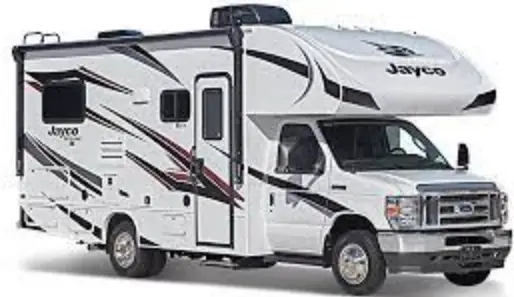
Class C RVs are a popular choice for those who want the convenience of an RV but don’t want to drive a large Class A motorhome. Class C RVs are built on a van or truck chassis and are typically smaller and more fuel-efficient than Class A motorhomes.
The average gas mileage for a Class C RV is between 14 to 20 miles per gallon, depending on the size, weight, and driving conditions. The smaller Class C RVs tend to have better gas mileage than the larger ones.
Class C RV Gas Mileage Examples
Here are some examples of Class C RV gas mileage based on different models and driving conditions:
| Class C RV Make and Model | Class C RV Gas Mileage |
| Winnebago Minnie Winnie | 15 mpg |
| Jayco Melbourne | 14 mpg |
| Thor Motor Coach Four Winds | 12-14 mpg |
| Coachmen Freelander | 10-12 mpg |
| Forest River Sunseeker | 8-12 mpg |
| Gulf Stream Conquest | 8-12 mpg |
| Leisure Travel Vans Wonder | 15-18 mpg |
| Coach House Platinum | 12-15 mpg |
| Pleasure-Way Plateau | 14-16 mpg |
| Roadtrek Zion | 16-18 mpg |
| Dynamax Isata 3 | 14-16 mpg |
| Fleetwood Jamboree | 8-12 mpg |
| Fleetwood Pulse 24A | 15.2 mpg |
| Forest River 3010DS | 9 mpg |
| Itasca Navion | 18 mpg |
Class C RVs are a popular choice for those who want the convenience of an RV without sacrificing fuel efficiency. While gas mileage can vary depending on several factors, RVers can take steps to improve gas mileage and get the most out of their Class C motorhome.
What Affects the Gas Mileage an RV Gets?
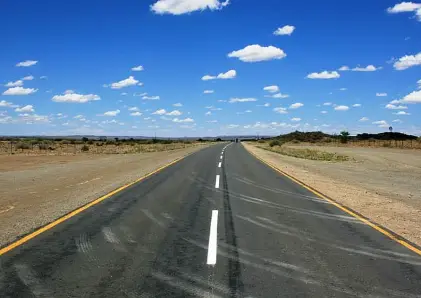
When it comes to RV gas mileage, there are several factors that can affect how many miles per gallon (MPG) your rig gets. Here are some of the most significant factors to consider:
The Weight Of Your RV
The weight of your RV is one of the most significant factors that can affect fuel efficiency. Heavier RVs require more fuel to move, which means you’ll get lower MPG. Make sure to take into account the weight of your fuel tank, freshwater tank, and any other gear you’re carrying when calculating your RV’s weight.
The Size Of Your RV
The size of your RV can also affect gas mileage. Smaller RVs tend to be more fuel-efficient than larger ones because they’re lighter and have less wind resistance. If you’re looking to save money on gas, consider downsizing to a smaller RV.
The Length Of Your RV
The length of your RV can also affect fuel efficiency. Longer RVs have more drag and wind resistance, which means they require more fuel to move. If you’re looking to improve your RV’s gas mileage, consider shortening your rig.
Other factors that can affect RV gas mileage include:
- Speed: Driving faster than 55-60 MPH can decrease fuel efficiency.
- Terrain: Driving uphill or in windy conditions can decrease fuel efficiency.
- Maintenance: A well-maintained RV will get better gas mileage than one that’s overdue for maintenance.
- Driving habits: Aggressive driving, such as sudden braking and rapid acceleration, can decrease fuel efficiency.
- Stop-and-go traffic: Lots of stop-and-go traffic can decrease fuel efficiency.
By taking these factors into account, you can improve your RV’s gas mileage and save money on fuel costs during your next RV trip.
Why Diesel RVs Get Better Mileage Than Gas RVs
Diesel RVs have been known to get better gas mileage than gas RVs. There are several reasons for this, including:
- Diesel Engines: Diesel engines are more fuel-efficient than gas engines. They have a higher thermal efficiency, which means they can convert more of the fuel’s energy into mechanical energy. This results in better fuel economy and lower fuel consumption.
- Turbo Diesel Engines: Turbo diesel engines are even more efficient than regular diesel engines. They use a turbocharger to compress the air entering the engine, which allows for more fuel to be burned. This results in more power and better fuel economy.
- Lower RPMs: Diesel engines run at a lower RPM than gas engines, which means they don’t have to work as hard to maintain speed. This results in less wear and tear on the engine and better fuel economy.
- Fuel Costs: Diesel fuel has historically been cheaper than gas, which means you can save money on fuel costs over time. Although recently, diesel prices have been higher than gasoline! While the initial cost of a diesel RV may be higher, the savings in fuel costs can make up for it in the long run.
- Resale Value: Diesel RVs often have a higher resale value than gas RVs. This is because they are more fuel-efficient and have a longer lifespan. This means you can recoup more of your initial investment when it’s time to sell.
How to Improve RV Gas Mileage
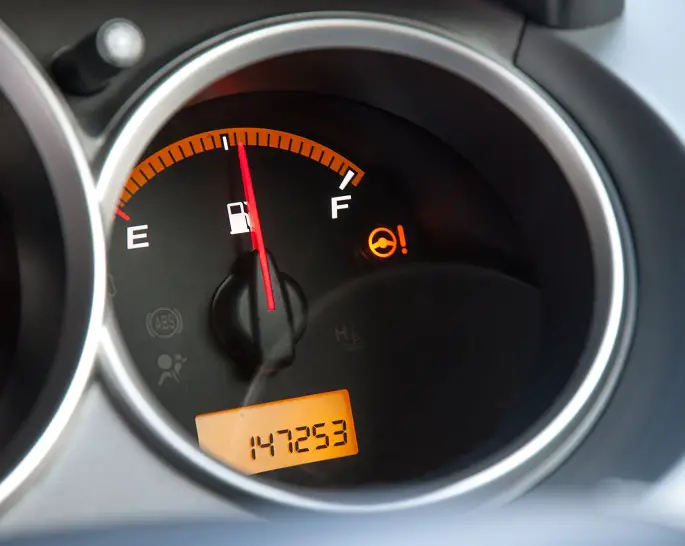
Traveling in an RV is an adventure that many people enjoy. However, it can be expensive if you do not take steps to improve your RV gas mileage. Here are some tips to help you get the most out of your fuel and save money on your travels.
Pack Light
The weight of your RV has a significant impact on its fuel economy. The more weight you carry, the harder your engine has to work to move the RV. Therefore, it is essential to pack light and only bring what you need. Make a list of everything you plan to bring and remove items that are not needed.
Slow Down
Driving at high speeds can significantly reduce your RV’s gas mileage. The faster you go, the more wind resistance your RV encounters, which means your engine has to work harder. By slowing down, you can improve your fuel efficiency and save money on gas.
Drive Smoothly
Abrupt acceleration and braking can reduce your RV’s gas mileage. By driving smoothly and maintaining a consistent speed, you can improve your fuel efficiency. Avoid sudden stops and starts whenever possible.
Cruise Control Is Your Friend
Using cruise control can help you maintain a consistent speed and improve your RV’s gas mileage. It can also reduce driver fatigue, making your trip more comfortable.
Avoid Traffic When Possible
Stop-and-go traffic can significantly reduce your RV’s gas mileage. Whenever possible, try to avoid congested areas and take alternative routes to your destination.
Turn The AC Down
Running your RV’s air conditioning can reduce your gas mileage. Turn the air conditioning down or off when you do not need it. You can also use fans or open windows to keep your RV cool.
Keep up with RV Maintenance
Regular maintenance is crucial to keep your RV running smoothly and improve its gas mileage.
Make sure to change your oil, RV tires, air filters, and other filters on time. Also, keep your tires properly inflated and aligned.
Don’t Leave Your Engine Idling
Leaving your engine idling wastes fuel and reduces your RV’s gas mileage, so try and turn off your rig’s engine when possible.
Downsize Your RV
It may not seem easy, but if you have a large RV, downsizing to a smaller one can significantly improve your gas mileage. Smaller RVs are lighter and more aerodynamic, making them more fuel-efficient.

